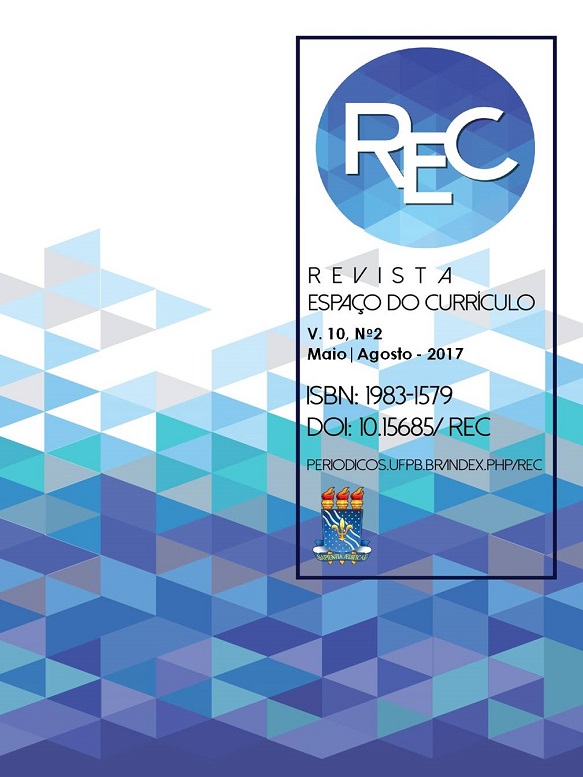the teaching of pedagogy in Mexico
DOI:
https://doi.org/10.15687/rec.v10i2.35909Keywords:
Resumes. Market. Pedagogical Cânone. Fragmentation.Abstract
This paper analyzes the way in which the education of the pedagogue in Mexico is characterized by the lack of a clear orientation. The approach to this situation is made through a characterization of the study plans of four universities; two of them offer a degree in Pedagogy and the other two offer a degree in Educational Sciences. The comparison is guided by the conjecture that within these subtly heterogeneous positions underlie what is understood by the work of the pedagogue and the graduate of Education Sciences. Specifically, in the case of careers in Pedagogy, two visions are drawn in which they are assumed, although in a somewhat confusing way: the precepts considered as derived from a tradition on pedagogy, at the same time that it was appreciated as a qualification for technical application of the necessary knowledge in the labor market. The exposed panorama, is supported especially in the interviews realized to investigators, educational and students assigned to different academic entities. An approach complemented by mentioning the topic of Normal Schools and the National Pedagogical University (UPN), institutions focused on basic education.
Downloads
Metrics
References
FURLÁN, Alfredo. Notas sobre la pedagogía. En: FURLÁN, Alfredo; PASILLAS, Miguel Ángel. El campo pedagógico. D.F.: UNAM, 1999.
HUARTE, Renato. Renato Huarte Cuellar: entrevista. Ciudad de México, 2017. 1 CD.
JONQUERES, Pilar. Educación y ciencia. El basilisco, España, n. 7., mayo-jun. 1979. Disponible en: <http://fgbueno.es/bas/bas10710.htm>. Consultado: 2 ago. 2017.
OCDE. Estudios Económicos de la OCDE: México. Visión general. [S.I]: OCDE, 2017. Disponible en: <https://www.oecd.org/eco/surveys/mexico-2017-OECD-Estudios-economicos-de-la-ocde-vision-general.pdf>. Consultado: 04 ago. 2017.
PASILLAS, Miguel Ángel. Estructura y modo de ser de las teorías pedagógicas. En: FERNÁNDEZ, Héctor; UBALDO, Samuel; GARCÍA, Olivia. Pedagogía y prácticas educativas. D.F.: UPN, 2008. p. 11-46.
PASILLAS, Miguel Ángel. Miguel Ángel Pasillas Valdez: entrevista. Ciudad de México, 2017. 1 CD.
PEÑA, Maribel. Maribel Peña Santos: entrevista. Ciudad de México, 2017. 1 CD.
REYES, Betzabeth. Betzabeth Reyes Pérez: entrevista. Ciudad de México, 2017. 1 CD.
ROJAS, Ileana. La formación del profesorado en el contexto de la posmodernidad. Algunas reflexiones sobre los saberes de los docentes de nivel básico. En: DUCOING, Patricia. La Escuela Normal. Una mirada desde el otro. D.F.: UNAM, Instituto de Investigaciones Sobre la Universidad y la Educación, 2013. p. 79-116.
SALMERÓN, Ana María. Ana María Salmerón Castro: entrevista. Ciudad de México, 2017. 1 CD.
SCHRIEWER, Jurgen. La construcción de la pedagogía científica. Diferenciación institucional y disciplinar, funciones formativas y praxis educativa de la ciencia universitaria de la educación en Alemania y Francia. Revista de educación, n. 296, 1991. Disponible en: <https://www.mecd.gob.es/dctm/revista-de educacion/articulosre296/re29606.pdf?documentId=0901e72b81357c60>. Consultado: 25 jul. 2017.
SERRANO, José Antonio. José Antonio Serrano Castañeda: entrevista. Ciudad de México, 2017. 1 CD.
SOTA, Eduardo. Pedagogía. En: SALMERÓN, Ana María; TRUJILLO, Blanca Flor; RODRÍGUEZ, Azucena del Huerto; TORRE, Miguel de la. Diccionario Iberoamericano de Filosofía de la Educación. Ciudad de México: Fondo de Cultura Económica, FFyL, UNAM, 2016. Disponible en: <http://fondodeculturaeconomica.com/dife/definicion.aspx?l=P&id=94>. Consultado: 18 jul. 2017.
SUASNÁBAR, Claudio. La institucionalización de la educación como campo disciplinar. Revista Mexicana de Investigación Educativa, D.F., v. 18, n. 59, oct-dic. 2013. Disponible en: <http://www.comie.org.mx/v1/revista/portal.php?idm=es&sec=SC03&&sub=SBB&criterio=ART59011>. Consultado: 17 jul. 2017.
TEDESCO, Juan Carlos. Educación y Justicia Social en América Latina. Buenos Aires: Fondo de Cultura Económica, 2012.
TRUJILLO, Blanca Flor. Blanca Flor Trujillo Reyes: entrevista. Ciudad de México, 2017. 1 CD.
UAEH. Licenciatura en Ciencias de la Educación. Plan 2014, 2017. Disponible en: < https://www.uaeh.edu.mx/campus/icshu/oferta/licenciaturas/lic_educacion_plan2014.html>. Consultado: 14 jul. 2017.
ULSA. Licenciatura en Ciencias de la Educación, 2017. Disponible en: < http://www.lasalle.mx/oferta-educativa/licenciaturas/facultad-humanidades/ciencias-de-la-educacion/>. Consultado: 16 jul. 2017.
UNAM. Plan de estudios 2010, 2017. Disponible en: < http://pedagogia.filos.unam.mx/plan-de-estudios-2010/>. Consultado: 15 jul. 2017.
UNESCO. Replantear la educación ¿Hacia un bien común mundial? Francia: UNESCO, 2015. Disponible en: <http://unesdoc.unesco.org/images/0023/002326/232697s.pdf>. Consultado: 4 jul. 2017.
UPN. Acerca de la UPN, 2017. Disponible en: < http://www.upn.mx/index.php/conoce-la-upn/acerca-de-la-upn>. Consultado: 13 ago. 2017.
UVM. Licenciatura en Pedagogía, 2017. Disponible en: < https://www.universidaduvm.mx/licenciatura-en-pedagogia>. Consultado: 15 jul. 2017.
Downloads
Published
How to Cite
Issue
Section
License
By submitting an article to Curriculum Space Journal (CSJ) and having it approved, the authors agree to assign, without remuneration, the following rights to Curriculum Space Journal: first publication rights and permission for CSJ to redistribute this article. article and its metadata to the indexing and reference services that its editors deem appropriate.
















